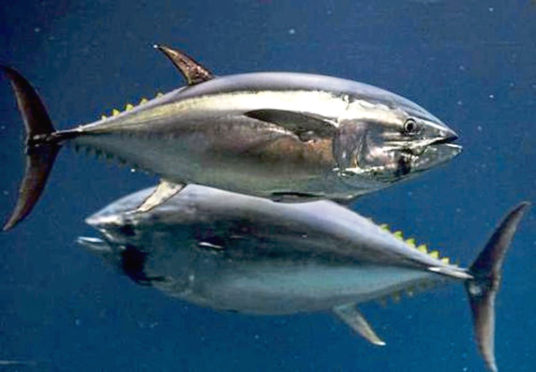Have you any idea what natal philopatry means? I hadn’t a scooby either, but that phrase is being bandied about in this neck of the woods because of the unusual characteristics of tuna.
Let’s be clear, the characteristics I am on about are not that fishy burp that the lower classes may occasionally emit after dining on a tuna sandwich. These are the characteristics of Atlantic bluefin tuna when they are very much alive. Their habits are in the news here after a tuna broke into a salmon farm in Loch Roag, near Great Bernera.
That’s right. It broke in, not out. Farmed salmon are often in the news for managing to get out of their cages but this fishy fiend was apparently going so fast it tore through the mesh like a hot knife through lashings of melting butter to go on a roll for a tuna and mayonnaise sarnie. Hmmm. Sorry, I got carried away there. I haven’t had my lunch yet and I am drooling. The question is why was this bluefin equivalent of a boy racer so excited and energetic in the big seal loch around the island of Bernera?
It was probably down to natal philopatry, I’m told. Let me explain what I have learned. Philopatry is the natural urge of some creatures to stay in or habitually return to a particular area, often the place where they were born or raised. You know, philopatry is what keeps CalMac in business as all the mainland-based maws from all the corners of the Hebrides make their annual summer sojourn back across the Minch to see relatives and other people that they don’t want to see more often than once per annum.
Natal philopatry, however, takes that old urge a bit further. It’s pre-natal journeying. It’s when creatures, and I include many of us Lewis people, Hearachs and those from up south in this, return to their birthplace to breed – you know, have a sprog or seven. You get the idea. I did that. One sprog was quite enough for me, by the way, but some ancient longing stirred something in my dungarees in faraway Croydon and I decided, like a bluefin tuna, that the distant Hebrides and not south London were where I would do what had to be done to assuage that ancient, and very natural, need.
Migrating species such as the Atlantic bluefin are way out in the ocean most of the time but they head back to their old splashing grounds for courting. The turbo-charged bluefin that was chasing the mackerel shoal at 40mph and which failed to brake in time to avoid careering into The Scottish Salmon Company’s net was no minnow. The fish farm workers who netted it to lead it back to the sea reckon he was 47 stones. It was probably bred on the Bernera side of the loch. Kirkibost has always produced a sturdy type, built like a proverbial brick outhouse.
After their pre-natal travel, some creatures will return to their usual surroundings. Others may decide that post-natal travel is not for them and just stay put. Did I say that right? I get confused with pre-natal and post-natal. Pre means before. Post means after. I have to think hard about which is which or whether to use one or two. Maybe not two. To use both prefixes together would be preposterous.
I’ll tell you who is preposterous. Carlos, a dedicated animal lover from Laxdale, who is originally from Barcelona. I was telling him about the bluefin coming back to Bernera for the mating season. Carlos said he was finding it very hard to believe that the tuna came back for that purpose and he didn’t think we should attribute human behaviour to the animal kingdom. That’s rich coming from him. He is always teaching his dog new tricks. Carlos said to me: “My dog Santiago is learning to speak a foreign language.” I said: “Really? Espanol?” He said: “No, mate. He’s a Labrador.”
After the monster tuna had raided the salmon cages at Loch Roag, it was released by the salmon workers. It then met up with the rest of its family – mamma tuna and li’l tuna. As they were headed out past Valtos Beach to Gallan Head, they came across a solitary submarine. It was probably there lying low because submariners have been criticised for partying when they come ashore even though they keep their social distance from landlubbers. So they probably party on down under the waves, where no one can hear them sing shanties. All together now … “We all live in a …”
What kind of navigation systems do these creatures have? Imagine a fish comes into the world in a sea loch. They then swim out to sea for most of their lives, and then one day years later swim back against insurmountable odds to the very spot where they were born. I suppose we humans are born with natural GPS too? I somehow doubt it. Yesterday, I couldn’t even find my van in the Tesco car park.

